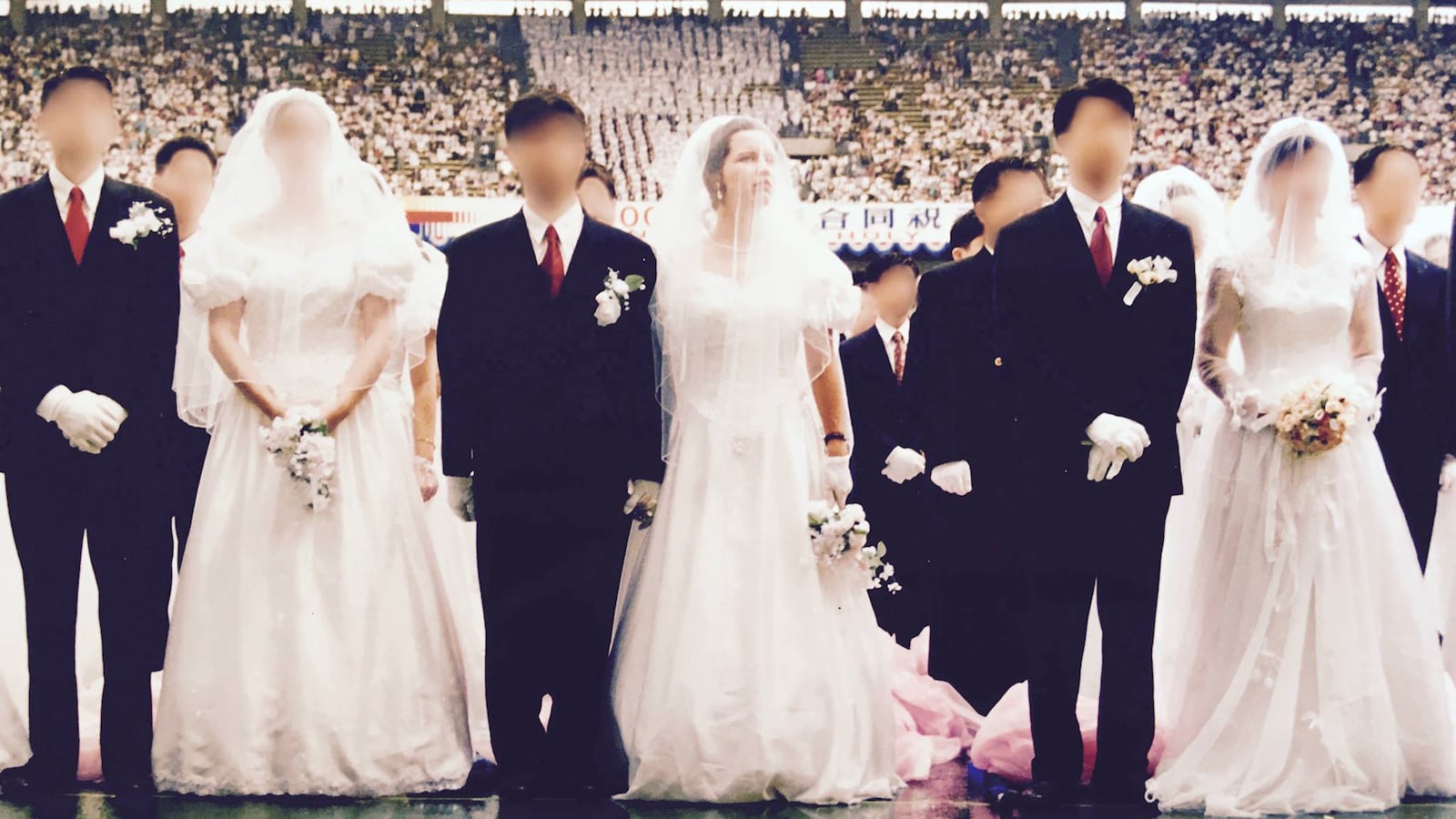For most of her life, Cara Jones was part of a “cult”—namely, the Unification Church founded and led by Reverend Sun Myung Moon. Rising to American prominence in the 1970s (where its adherents were commonly referred to as “Moonies”), the movement preached that Moon was God’s messiah, and thus that his teachings were of divine and paramount importance taking precedence over all other beliefs, thoughts, and desires. Through mass-arranged marriages and strict guidelines about sexual behavior, the organization infiltrated every part of a member’s existence.
For Jones, it was the bedrock of her family—her father even served for a time as church president—and the crux of her identity, which is why severing herself from the church meant initiating a traumatic break from the people she loved the most, as well as a process of self-actualization that continues to this day.
Blessed Child is director Jones’ autobiographical account of that journey, offering an intimate inside look at the Unification Church. Premiering at DOC NYC on Nov. 9, the documentary is less a dry historical overview than an experiential snapshot of the group’s operational strategies and practices on a micro level. Promising a brand of happiness, togetherness, tolerance and holiness that prior movements—such as the peace-and-love hippies of the ‘60s—had supposedly failed to deliver, the Unification Church sought to create a harmoniously diverse new world order that would bond everyone in a big happy family. At the head of that unit was the charismatic Moon himself, known as the “True Father,” a veritable Adam (alongside his Eve, wife Hak Ja Han, aka the “True Mother”) born without original sin, and capable of forging a new generation free of that same inherent stain.
The irony—at least for Jones, and those like her—is that the church achieved the opposite of its stated goals, begetting unhappiness, ruin and alienation. The film begins with Jones delivering a public reading at San Francisco’s 2017 Moth Storytelling GrandSLAM about her wedding, set to home movie footage of that momentous event. Unlike most nuptials, Jones’ big day was not a solitary experience in which she commanded the spotlight; rather, she was betrothed to a Korean man in an enormous stadium ceremony known as “The Blessing” that was presided over by Reverend Moon. Asked to make a promise to God, humanity and each other, she screamed “Yes!” in Korean alongside hundreds of like-minded men and women, thereby embarking on the same path that had been followed by her parents and siblings, including an older brother who was getting hitched at the same ceremony.
Jones’ union wasn’t meant to be. Yet before it addresses her rejection of her life’s core principles, Blessed Child jumps back to the middle of this decade, to Jones injecting herself with medications designed to facilitate pregnancy. As she admits, this is light years removed from the way she envisioned beginning her own family, and that conflict—between the ideals she was instilled with from birth, and the reality of her adult circumstances—is central to the film. There’s no easy resolution to the schism between Jones’ past and present, and though she’s since left the church (and turned her back on most of what it preaches), she’s still on relatively good terms with her four brothers and her parents, who now reside in Kailua-Kona, Hawaii, and maintain what appear to be solid connections to the church.
Jones imparts a sense of crazy Unification Church life via her own story. As an infant, that involved being left with a nanny until she was two-and-a-half years old (while her mother embarked on missionary work). And as a young child, it included kid-driven prayer meetings during which she and her brothers opened up in crying-hugging-confessional fashion. They were, they claim, akin to a picture-perfect clan: the kids got great grades and respected their parents, and love and smiles were bountiful. After going to Princeton University, Jones was married to a man she viewed as more of a “brother,” and that’s when things went downhill in a spiral of partying, cheating, and budding ideas at odds with the Unification Church and its rigid opposition to premarital sex and homosexuality—and its demand for complete submission to the organization.
With Jones’ younger brother Bow struggling, in this environment, to accept his own homosexuality, a crisis of faith was all but inevitable. When it came, there weren’t fireworks for Jones so much as a profound confusion over her identity, and future. Blessed Child recounts her attempts to reckon with her upbringing, and the church’s impact on her heart and mind, while simultaneously providing an overview of Moon’s messianic rule, which elicited widespread charges of brainwashing—backed up by numerous former members’ on-camera testimonials to Jones—and which was eventually undercut by revelations about his own extramarital affairs and tax evasion.
Through a series of candid interviews, Blessed Child illustrates both how the church’s alleged inclusivity came equipped with a strain of exclusionary bigotry, and the way in which it offered lost souls the very things they most craved (Jones’ dad, whose own father abandoned him as an adolescent, clearly found in Moon the paternal figure he never had). It’s too bad, then, that Jones narrows her gaze to an almost detrimental extent. At a too-short 74 minutes, her work leaves out a wealth of contextual information (How big is the church in the U.S. today? How many Blessings still take place? What of their ownership of The Washington Times?) and personal details (How did she meet her first husband? How did her parents specifically react to her split from the church? What are her brothers’ current relationships with the church?) that would have greatly deepened her non-fiction narrative.
At its best, however, Blessed Child captures the corrosiveness of mass group-think movements, which are frequently as successful at tearing people apart as they are at bringing them together. Even if Jones’ story is, by film’s end, far from over—and, in many respects, just beginning—it remains a stirring and illuminating one about the importance of individual agency and its compatibility with a truly loving family.


